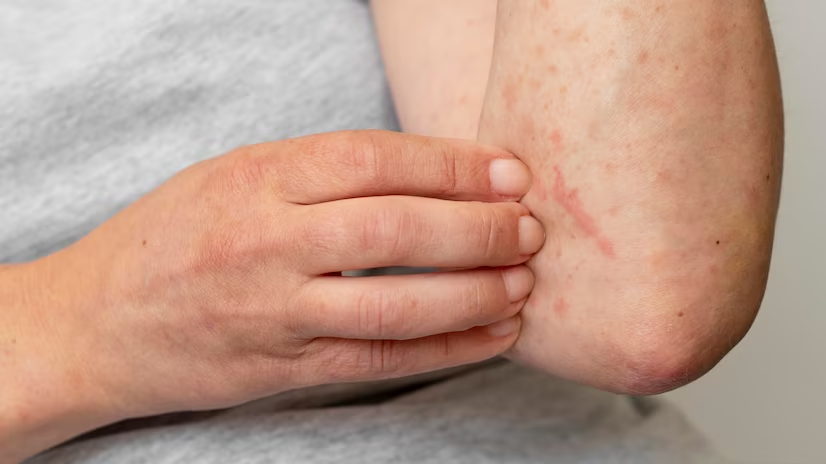
Our skin is a remarkable organ that serves as a protective barrier between our bodies and the outside world. It allows us to experience the sensations of touch, warmth, and pressure. However, for some individuals, this remarkable ability can become a source of discomfort and distress.
Skin sensitivity, particularly when it manifests as sensitivity to touch, can significantly impact one's daily life. Imagine the simple act of a gentle caress or a hug causing discomfort or pain. It can be a distressing experience that not only affects physical well-being but also takes a toll on emotional and mental health.
In this blog post, we aim to shed light on skin sensitivity and its impact on those who experience it. We will explore the various causes of skin sensitivity, including allergies, skin conditions, nerve disorders, and environmental factors. By understanding the underlying factors, we can better grasp the complexity of this condition.
What is Skin Sensitivity?

Skin sensitivity refers to a condition in which the skin reacts more strongly or intensely to certain stimuli compared to normal skin. It is characterized by an increased reactivity or responsiveness of the skin, resulting in sensations of discomfort, pain, itching, or irritation. When the skin is sensitive to touch, it means that even light pressure or gentle contact can elicit a heightened response or discomfort.
Skin sensitivity can manifest in various ways, including redness, itching, dryness, and a burning or stinging sensation. It can be caused by a range of factors, such as allergies, irritants, skin conditions like eczema or psoriasis, nerve disorders, or environmental factors like extreme temperatures or sun exposure.
Causes of Skin Sensitivity
When it comes to skin sensitivity, various underlying factors can contribute to this condition, including those specifically related to the skin being sensitive to touch. Let's explore some of the key causes:
Allergies and Sensitivities
Contact allergies
: Certain substances or materials, such as certain metals, fragrances, or latex, can trigger an allergic reaction when they come in contact with the skin. This can lead to getting skin sensitive to the touch.Irritants
: Harsh chemicals, soaps, detergents, or even certain fabrics can irritate the skin, making it more prone to sensitivity and discomfort when touched.
Skin Conditions
Eczema
: This chronic inflammatory skin condition can cause dryness, itchiness, and skin sensitive to touch. Individuals with eczema may experience heightened sensitivity when their skin is touched.Psoriasis
: Psoriasis is an autoimmune disease that speeds up the skin cell turnover process, leading to the accumulation of thick, scaly patches on the skin. These patches can make your skin sensitive to the touch.Rosacea
: Rosacea is a common skin condition characterized by facial redness, flushing, and the presence of small blood vessels. In some cases, the skin affected by rosacea can become sensitive and easily irritated when touched.
Nerve Disorders
Peripheral neuropathy
: Nerve damage or dysfunction in the peripheral nervous system can result in heightened sensitivity to touch, causing even gentle stimuli to be perceived as painful or uncomfortable.Fibromyalgia
: This chronic condition is associated with widespread [musculoskeletal pain](https://www.niams.nih.gov/health-topics/fibromyalgia#:~:text=Fibromyalgia%20is%20a%20chronic%20(long,a%20heightened%20sensitivity%20to%20pain.) and tenderness, including skin sensitivity to the touch on the surface.
Environmental Factors
Weather conditions
: Extreme temperatures, dry climates, or low humidity levels can lead to skin dryness and increased sensitivity to touch.Sun exposure
: Overexposure to the sun's harmful UV rays without adequate protection can damage the skin and make it more sensitive and prone to discomfort when touched.
Signs and Symptoms of Skin Sensitivity

Skin sensitivity, especially when it is specifically related to touch, can manifest through various signs and symptoms.
They can be divided into 2 types; Visible skin changes - redness, dryness, peeling, scaling, hives, bumps Subjective symptoms - itching, burning, stinging sensations
Let's explore some of the key indicators of skin sensitivity:
Itching and Irritation
Persistent itching
: Individuals with skin sensitive to touch may experience persistent itching, which can be triggered by even light touch or friction.Irritation or redness
: The skin may become visibly irritated and exhibit redness when touched or when in contact with certain materials or substances.
Increased Sensation
Heightened sensitivity
: Those with skin sensitive to the touch may experience an exaggerated response to tactile stimuli, perceiving even gentle touches as uncomfortable, painful, or irritating.Tingling or prickling sensations
: Some individuals may experience tingling or prickling sensations upon touch, which can be bothersome or cause discomfort.
Burning or Stinging Sensation
Burning or stinging
: When it feels that your skin sensitive to touch, individuals may experience a burning or stinging sensation upon contact, even with gentle pressure or light touches.Skin warmth
: The affected areas may feel warmer than usual due to the increased sensitivity of the skin.
Dryness or Flakiness
Dry and flaky skin
: Skin sensitive to touch can be accompanied by dryness and flakiness, making the skin more susceptible to irritation and discomfort when touched.
Skin Reactions
Rash or hives
: Skin sensitive to the touch may develop a rash or hives upon contact with certain triggers, such as allergens or irritants.Swelling or inflammation
: The affected skin areas may exhibit swelling or inflammation in response to touch or contact with specific substances.
Dermographism and physical urticaria
In dermographism, skin becomes red and swollen after a scratch. The word literally means that you can write on your skin.
Physical urticaria
means hives triggered by physical events like pressure, vibration, heat or cold. Ex: Patient taking a hot shower may suddenly erupt in a red rash. But it will spontaneously resolve within 1 to 2 hours once the skin cools down.
Diagnosing Skin Sensitivity
If you suspect that your skin is sensitive to touch or you experience symptoms of skin sensitivity, it is important to seek proper diagnosis to understand the underlying causes and develop an appropriate treatment plan. Here are some common methods used in diagnosing skin sensitivity:
Self-assessment and Tracking Symptoms
Keep a symptom journal
: Document your symptoms, triggers, and their intensity to identify patterns and potential triggers that cause your skin to become sensitive to touch.Self-assessments
: Complete questionnaires or assessments provided by dermatologists or healthcare professionals to evaluate your symptoms and their impact on your daily life.
Consulting a Dermatologist
Medical history review
: Provide a detailed medical history, including any previous skin conditions, allergies, or sensitivities, to help your dermatologist better understand your specific case.Physical examination
: A dermatologist will examine your skin, focusing on the areas that are sensitive to touch, to assess any visible signs, inflammation, or reactions.Discussion of symptoms
: Explain your symptoms, including the nature of the sensitivity to touch and any triggers that exacerbate the condition.
Allergy Testing
Patch testing:
Patch tests can help identify specific allergens or irritants that may be causing the skin sensitivity. Small patches containing potential allergens are applied to the skin, and any resulting reactions are observed.Skin prick test:
This test involves pricking the skin with tiny amounts of suspected allergens to assess the body's reaction and identify specific triggers.
Skin Patch Testing
This test involves applying a variety of substances or materials to small patches on your skin and monitoring for any adverse reactions or sensitivities. Patch testing can help identify potential irritants or allergens that are causing your skin to be sensitive to touch.
Tips for Managing and Soothing Skin Sensitivity

Living with skin sensitive to touch can be challenging, but there are various strategies you can employ to manage and soothe your skin. Here are some helpful tips to consider:
Avoiding Triggers and Irritants
Identify triggers
: Pay attention to factors that exacerbate your skin sensitivity, such as specific fabrics, chemicals, or environmental conditions, and make a conscious effort to avoid them.Choose gentle fabrics
: Opt for soft, natural fabrics like cotton or silk, which are less likely to irritate sensitive skin.
Using Gentle and Hypoallergenic Skincare Products
Read labels carefully
: Look for skincare products that are labeled as hypoallergenic, fragrance-free, and specifically formulated for sensitive skin.Patch test new products
: Before applying a new skincare product to your entire face or body, conduct a patch test on a small area of skin to ensure it doesn't trigger any adverse reactions.
Moisturizing and Hydrating the Skin
Use moisturizers regularly
: Apply a gentle, non-irritating, fragrance-free moisturizer to your skin immediately after bathing or showering to lock in moisture and prevent dryness.Drink plenty of water
: Hydrate your body from within by drinking an adequate amount of water throughout the day, as proper hydration can help maintain skin health.
Protecting the Skin from External Factors
Sun protection
: Apply a broad-spectrum sunscreen with a high SPF to shield your skin from harmful UV rays, which can exacerbate sensitivity and lead to sunburn.Shield against harsh weather
: In extreme temperatures, protect your skin by wearing appropriate clothing layers and using moisturizers to combat dryness caused by cold or hot weather.
Managing Stress and Emotional Triggers
Practice stress management techniques:
Engage in activities like yoga, meditation, or deep breathing exercises to help reduce stress, as high stress levels can aggravate skin sensitivity.Seek emotional support:
Reach out to friends, family, or support groups to share your experiences and find emotional support in coping with the challenges of skin sensitivity.Home remedies you can try for sensitive skin:
If your skin is irritated, go for a soothing bath like soaking colloidal oatmeal.
Coconut oil, honey, aloe vera, lacto calamine lotion can soothe your skin
Steroid creams such as hydrocortisone (can be bought over the counter) can reduce inflammation and relieve symptoms like redness, itching and swelling.
Numbing creams help to relieve itchiness and burning. Look for products with menthol and camphor.
Over the counter antihistamines will help to relieve itchiness. If you have any doubts, discuss with your doctor.
Seeking Professional Help for Skin Sensitivity
If you're experiencing skin sensitivity, particularly when your skin is sensitive to touch, seeking professional help can provide valuable guidance and support. Here are some key steps to consider:
Consult a Dermatologist or Healthcare Professional
Make an appointment with a dermatologist or healthcare professional who specializes in skin conditions to discuss your symptoms and concerns. Provide a comprehensive history: Share details about your skin sensitivity, including when it started, triggers you've identified, and any previous treatments or remedies you've tried.
Medical Evaluation and Diagnosis
A dermatologist will perform a thorough examination of your skin, paying specific attention to areas that are sensitive to touch, to assess any visible signs or reactions. Depending on your symptoms and medical history, your healthcare provider may recommend allergy testing, patch testing, or other specialized tests to identify underlying causes or triggers.
Treatment Plan and Management
Personalized treatment approach
: Based on the examination and diagnostic findings, your healthcare provider will develop a tailored treatment plan to address your skin sensitivity and manage related symptoms.Medications or topical treatments
: Your healthcare provider may prescribe oral medications or recommend specific topical treatments, such as antihistamines, corticosteroids or emollients, to alleviate symptoms and reduce skin sensitivity. If the irritated skin has secondary infection, antibiotics may be prescribed to apply locally or to take orally depending on the severity.Lifestyle modifications
: Your healthcare provider can provide guidance on lifestyle changes, including skincare routines, dietary adjustments, and stress management techniques, to help manage and soothe your skin.
Follow-up Appointments and Monitoring
Attend follow-up appointments as recommended by your healthcare provider to monitor your progress, discuss any concerns, and make any necessary adjustments to your treatment plan. Maintain open and honest communication with your healthcare provider, reporting any changes or new symptoms you experience.
Conclusion
Living with skin sensitive to touch can be a challenging experience, but with proper understanding, management, and professional support, it is possible to find relief and improve your skin's comfort. Take care of your skin, listen to its needs, and prioritize your overall well-being. With time, patience, and the right strategies, you can achieve a healthier and more comfortable relationship with your sensitive skin, even when it is sensitive to touch.









